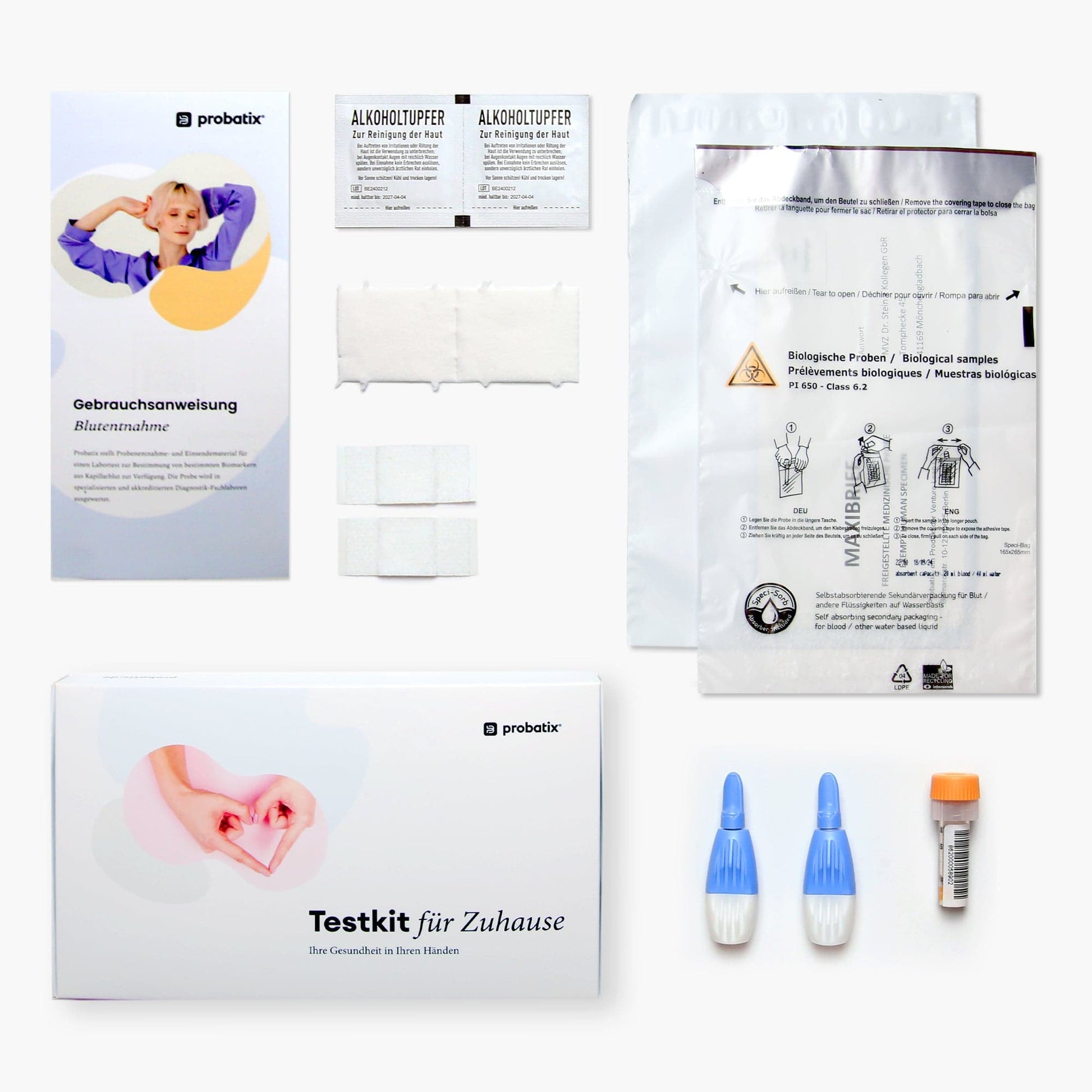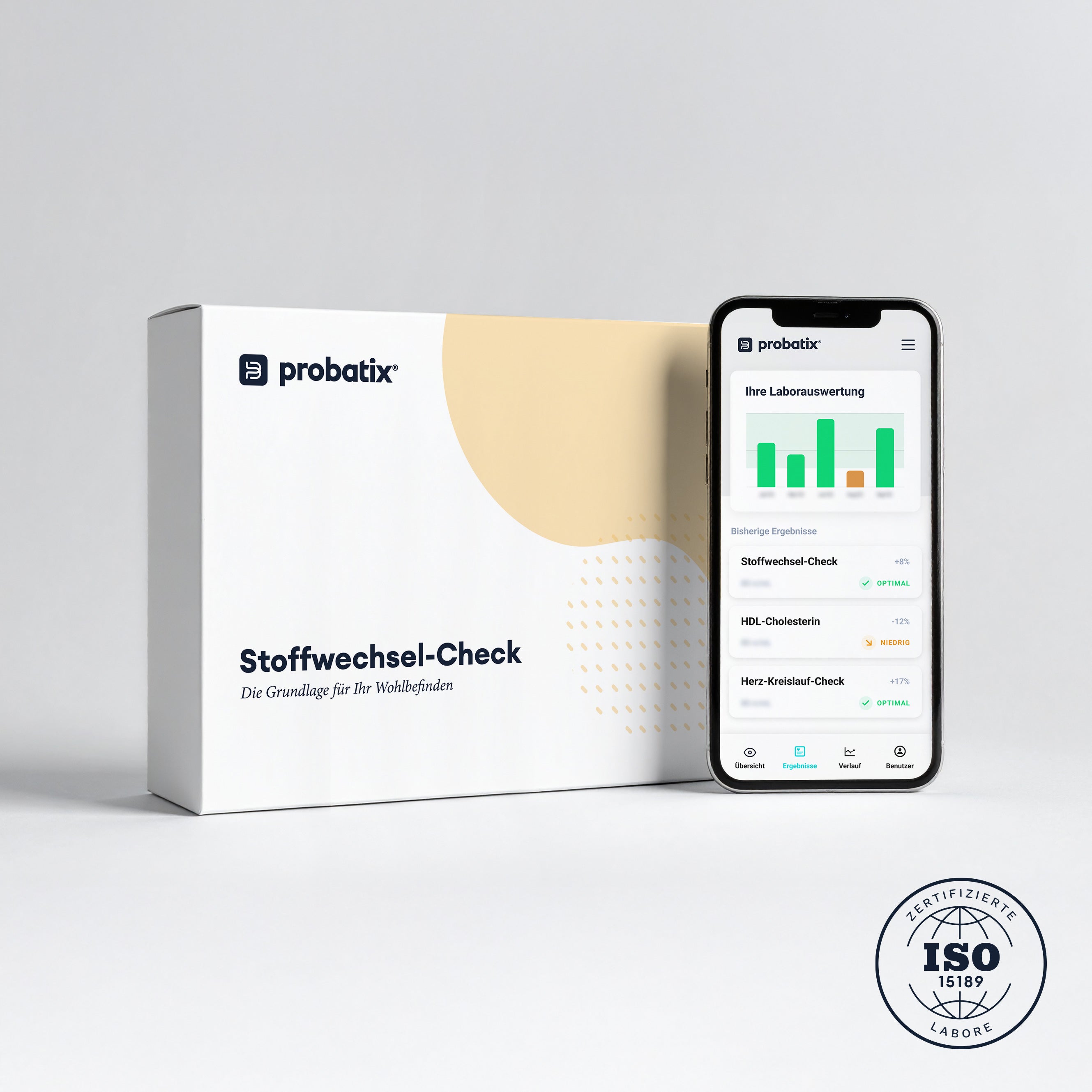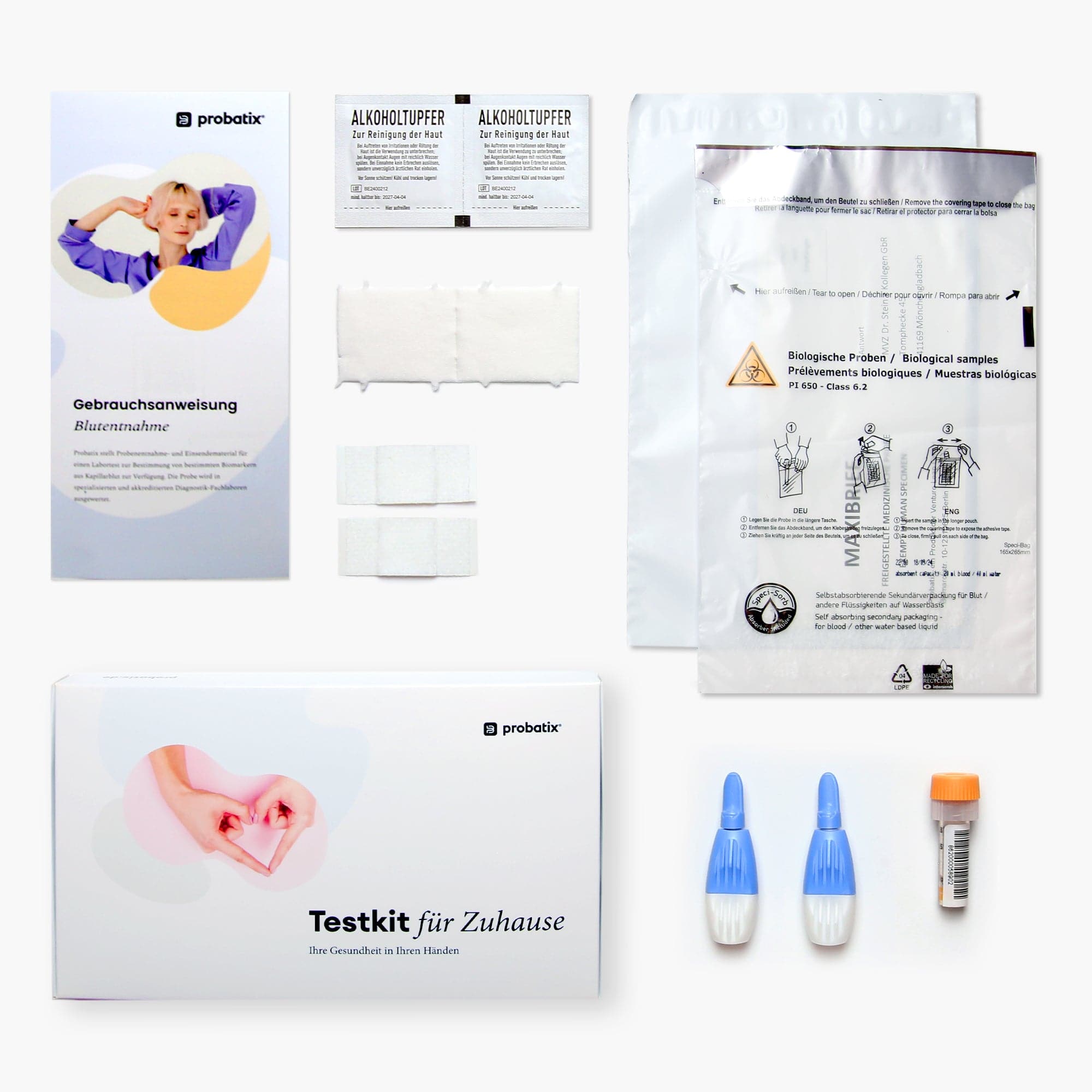Metabolism Profile
Metabolism Profile
Your metabolism affects energy, weight, and overall well-being – with the Metabolism Profile, you gain detailed insight into your key metabolic values.
- Comprehensive Metabolic Analysis: Measurement of cholesterol (total, HDL, LDL), triglycerides, HbA1c, calcium, cystatin C, GPT (ALT, ALAT), and vitamin B12.
- Early Detection Made Easy: Identifies potential metabolic disorders, nutrient deficiencies, and risks for diabetes, cardiovascular, or organ diseases.
- Convenient & reliable: Easily collect a blood sample at home, professional lab analysis, and clear results in the dashboard.
Clarity about your metabolism – for better decisions in everyday life.
In Stock
What values does this test measure?
What values does this test measure?
Further information on the values can be found here.
How does it work?
How does it work?
1. Take a sample with our test kit
2. Send the sample to the lab using the prepaid envelope
3. View results digitally after a few days
Why are the values reliable?
Why are the values reliable?
All tests offered by us are evaluated and validated in certified medical laboratories in Germany.
This is what the press says about our tests
Metabolism Profile: All details about the test
What benefits does this test offer me?
What benefits does this test offer me?
Metabolism is the central system of our body that controls energy production, nutrient utilization, and regeneration. Even small imbalances can cause fatigue, weight fluctuations, or long-term conditions such as diabetes and cardiovascular problems – often long before the first symptoms appear.
With the Metabolism Profile, you receive a comprehensive analysis of the key values directly related to your metabolism. This allows you to identify potential risks early and take targeted countermeasures.
The Metabolism Profile covers the following areas:
- Blood Sugar & Diabetes Risk: HbA1c shows your blood sugar control over the last 2–3 months.
- Lipid Metabolism & Heart Health: Total cholesterol, LDL, HDL, and triglycerides provide insight into your risk for arteriosclerosis and cardiovascular diseases.
- Liver and kidney function: GPT (ALT, ALAT) and Cystatin C indicate whether detoxification and excretion are in balance.
- Mineral balance: Calcium is important for bone strength, muscle function, and energy metabolism.
- Nutrient status: Vitamin B12 is crucial for blood formation, nerve function, and energy.
How does the test work?
The procedure is simple: With the test kit, you take a small blood sample at home and send it to our certified specialist laboratory. After a few days, you will receive a detailed report with clear explanations of your metabolic values.
What do the measured values mean?
What do the measured values mean?
HbA1c is a long-term blood sugar value that indicates the average blood sugar level over the past two to three months. It forms when sugar attaches to the red blood pigment hemoglobin. Since red blood cells live for about three months, the HbA1c value provides a good overview of long-term blood sugar control.
A high HbA1c value suggests poorly controlled or previously undetected diabetes. Normal values indicate stable and good blood sugar control.
Cholesterol
Cholesterol is a fat-like substance that the body needs for many important functions. It is a building block of cell membranes, a precursor for hormones such as estrogen and testosterone, and for the formation of bile acids. A portion is absorbed through food, but the majority is produced in the liver.
Too high cholesterol levels can lead to deposits in the vessel walls and increase the risk of cardiovascular diseases. However, a balanced level is important, as cholesterol is also indispensable for health.
HDL cholesterol
HDL cholesterol is often referred to as "good cholesterol" because it transports excess cholesterol from the vessels to the liver. There, it is broken down or recycled, reducing deposits in the arteries. Thus, HDL helps to keep the vessels healthy and free from calcifications.
High HDL levels are considered beneficial as they are associated with a lower risk of cardiovascular diseases. On the other hand, low levels increase the risk of arteriosclerosis and heart attack.
LDL cholesterol
LDL cholesterol is referred to as "bad cholesterol" because it transports cholesterol from the liver to the body's cells. Excess LDL can deposit in the vessel walls and form so-called plaques. These deposits narrow the vessels and increase the risk of cardiovascular diseases.
High LDL levels are an important risk factor for arteriosclerosis, heart attack, and stroke. Low levels, on the other hand, are considered beneficial for vascular health.
Triglycerides
Triglycerides are the main form of fats in the body and are primarily stored in fat cells. They are formed when excess energy from food is converted into fat. Some triglycerides circulate in the blood and serve as an energy source.
Elevated triglyceride levels can increase the risk of cardiovascular diseases, especially when LDL is high and HDL is low at the same time. Very high levels can also trigger inflammation of the pancreas.
Cystatin C
Cystatin C is a protein that is produced in all body cells and is filtered out of the blood by the kidneys. Since the production of Cystatin C in the body is relatively constant, the value is well-suited for assessing kidney function.
In contrast to creatinine, Cystatin C rises early when kidney performance declines. Therefore, it is considered a sensitive marker for timely detection of early kidney weakness.
GPT (ALT, ALAT)
GPT, also called ALT, is an enzyme that occurs almost exclusively in the liver. When liver cells are damaged, it enters the blood and the level rises.
An elevated GPT level is therefore a sensitive indicator of liver diseases such as hepatitis or fatty liver. Normal values indicate a healthy liver.
Vitamin B12
Vitamin B12 is an essential vitamin required for the formation of red blood cells, the functioning of the nervous system, and the production of DNA. It is found almost exclusively in animal foods such as meat, fish, eggs, and dairy products.
A deficiency in Vitamin B12 can lead to anemia, fatigue, concentration problems, and nerve damage. Those at increased risk for a deficiency include primarily older people, vegetarians, vegans, or individuals with absorption disorders in the intestine.
Calcium
Calcium is an essential mineral primarily stored in bones and teeth. It ensures the stability of the skeleton and plays an important role in muscle function, blood clotting, and nerve signal transmission. A blood test measures the portion circulating in the blood.
Too low calcium levels can cause muscle cramps, tingling, or heart rhythm disturbances. Too high levels often indicate disorders of the parathyroid gland, certain tumors, or excessive intake of vitamin D.
Why is this test important?
Why is this test important?
A healthy metabolism is crucial for energy, weight control, and stable cardiovascular health. Many metabolic disorders such as diabetes or lipid metabolism disorders develop gradually and remain unnoticed for a long time. With the metabolic profile, you can monitor the key values early and take targeted countermeasures in a timely manner.
When should I take this test?
When should I take this test?
- html
- In case of unexplained fatigue, exhaustion, or lack of drive.
- If you suffer from overweight or unintended weight loss.
- In case of a family history of diabetes or lipid metabolism disorders.
- If you suspect elevated cholesterol levels or blood sugar problems.
- For regular monitoring of vitamin and mineral supply.
The Metabolism Profile helps you to specifically optimize your metabolism and reduce health risks early. An additional vitamin and mineral test can also provide clarity.
What is included in the test kit?
What is included in the test kit?
Where can I find the instructions?
Where can I find the instructions?
Bei Fragen hilft Ihnen auch immer gerne unser wunderbarer Support weiter: support@probatix.de
FAQ - More Frequently Asked Questions about the Test
FAQ - More Frequently Asked Questions about the Test
What is examined in the Metabolism Profile?
The Metabolism Profile analyzes key markers: Total cholesterol, HDL and LDL cholesterol, triglycerides, HbA1c, calcium, vitamin B12, GPT (ALT, ALAT) and cystatin C. These values provide a comprehensive picture of your metabolism.
Who is this test suitable for?
The test is ideal for anyone who wants to check their metabolism, blood sugar, and cholesterol – especially if there is a suspicion of nutrient deficiency, diabetes, cardiovascular risks, or as part of a preventive examination.
How does the sampling work?
The sampling is simple and painless via capillary blood from the fingertip. You will receive a test kit with clear instructions for easy home use.
How long does it take to receive my results?
After submitting the sample, you will typically receive your lab results digitally within 3–5 business days.
Why is the HbA1c value important?
HbA1c indicates the average blood sugar level over the past 2–3 months and helps in early detection of diabetes or monitoring blood sugar control.
What does the lipid profile say about my health?
LDL cholesterol (“bad” cholesterol) can promote vascular deposits, while HDL cholesterol (“good” cholesterol) helps remove excess cholesterol. Together with triglycerides, the lipid profile is crucial for cardiovascular health.
What role do Vitamin B12 and Calcium play?
Vitamin B12 is essential for energy metabolism, nerve function, and blood formation.Calcium is crucial for bone stability, muscle strength, and signal transmission in the nervous system.
What happens if my values are outside the reference range?
If abnormalities are detected, you should discuss the results with a doctor. They can recommend further examinations or targeted measures.
Das sagen unsere Kunden
Your benefits for your health
Test with minimal effort
Understanding Your Own Health
Recognize changes early
















